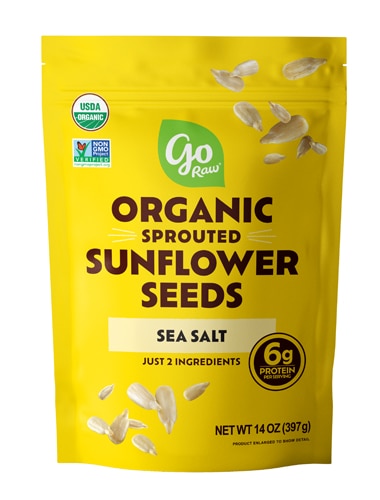Go Raw Organic Sprouted Sunflower Seeds Sea Salt Description
- USDA Organic
- Non-GMO Project Verified
- Gluten Free • Vegan
- Good Source of Protein
- Good Source of Magnesium
- Good Source of Manganese
Why Raw?
By sprouting and then gently drying, not cooking, we unlock and preserve more powerful nutrients.
All sunflower seeds are not created equally. Most conventional seeds are soaked in oil and roasted until most of the nutrients are cooked out. Ours are raw, sprouted and finished with just a dash of Celtic sea salt, so they taste great and are easier to digest, and far less of the delicate nutrients are destroyed in processing. Sprouted sunflower seeds are jam packed with protein and the powerful antioxidants vitamin E and Selenium, which work together to prevent cell damage from free-radicals. They help to raise good HDL and lower bad LDL cholesterol, are a great source of folate and folic acid, as well as containing fiber, iron, zinc and copper.
Sprouting seeds multiplies powerful nutrients and unlocks enzymes to super-charge digestion and support optimal health. Keeping it raw - gently dried, not cooked - helps preserve the health benefits of every ingredient.
Get healthy and Go Raw!
Directions
Refrigeration is not necessary, but is recommended to help preserve freshness after opening.
Free Of
Gluten, GMOs, and nuts
*These statements have not been evaluated by the Food and Drug Administration. This product is not intended to diagnose, treat, cure, or prevent any disease.
Nutrition Facts
Serving Size: 1/4 Cup (28 g)
Servings per Container: 14
| Amount Per Serving | % Daily Value |
|
| Calories | 190 | * |
|
| Calories from Fat | 140 | * |
|
| Total Fat | 16 g | 25% |
|
| Saturated Fat | 2 g | 10% |
|
| Polyunsaturated Fat | 8 g | * |
|
| Monounsaturated Fat | 6 g | * |
|
| Trans Fat | 0 g | 0% |
|
| Cholesterol | 0 mg | 0% |
|
| Sodium | 190 mg | 8% |
|
| Potassium | 190 mg | 6% |
|
| Total Carbohydrate | 6 g | 2% |
|
| Dietary Fiber | 2 g | 8% |
|
| Sugars | 0 g | * |
|
| Protein | 6 g | 12% |
|
| Vitamin A | | 0% |
|
| Vitamin C | | 0% |
|
| Calcium | | 2% |
|
| Iron | | 8% |
|
| Thiamin | | 6% |
|
| Riboflavin | | 4% |
|
| Niacin | | 6% |
|
| Vitamin B6 | | 8% |
|
| Folate | | 8% |
|
| Pantothenic Acid | | 2% |
|
| Phosphorus | | 15% |
|
| Magnesium | | 15% |
|
| Zinc | | 8% |
|
| Selenium | | 8% |
|
| Copper | | 15% |
|
| Manganese | | 15% |
|
*Daily value not established.
Other Ingredients: Sprouted organic sunflower seeds, celtic sea salt
Made in a facility that processes coconut and sesame seeds
The product you receive may contain additional details or differ from what is shown on this page, or the product may have additional information revealed by partially peeling back the label. We recommend you reference the complete information included with your product before consumption and do not rely solely on the details shown on this page. For more information, please see our
full disclaimer.
Reviews
View printable version
Print Page
Vegan Chocolate-Covered Strawberry Cheesecake Bars
[vc_row][vc_column][vc_column_text]Treat your loved ones (or yourself!) to a slice of pure bliss this Valentine’s Day with these no-bake vegan strawberry cheesecake bars topped with a luscious chocolate ganache. Made with wholesome vegan and gluten-free ingredients, these dreamy bars feature a crunchy base, a creamy strawberry layer and a rich chocolate finish. What better way to spread some love than with a dessert that’s sweet, beautiful and better for you!

Vegan Chocolate-Covered Strawberry Cheesecake Bars

Crust
- 1/2 cup rolled oats
- 3 Tbsp. white sesame seeds (lightly toasted)
- 1/3 cup shredded coconut
- 1/3 cup sunflower seeds
- 5 Tbsp. coconut sugar
- 1 Tbsp. raw cacao powder (or cocoa powder)
- Pinch salt
- 4 Tbsp. melted coconut oil (or melted raw cacao butter)
Strawberry cheesecake
- 7 oz. raw cashews
- 3.5 oz. fresh strawberries
- 2/3 cup coconut milk
- 6 Tbsp. melted coconut oil (or melted raw cacao butter)
- 5-6 Tbsp. maple syrup
- 3 Tbsp. lemon juice
- 1 tsp. lemon zest
- 1 tsp. vanilla extract
Optional
- 1-3 slices raw or cooked red beet root (for color)
Chocolate ganache
- 4.2 oz. dark chocolate chips
- 2/3 cup coconut milk (or other plant milk)
- Line 7-inch square pan with parchment paper or use one with removable bottom.
In food processor, blend all crust ingredients except for coconut oil until powdery. Add melted coconut oil and blend until mixture reaches consistency of wet sand. (Note: If too crumbly, add a little more coconut oil.)
- With hands or bottom of glass, press mixture firmly into bottom of pan.
In blender, blend all strawberry cheesecake ingredients until smooth. Taste and adjust sweetness, adding additional maple syrup or lemon juice, if needed.
- Add strawberry layer on top of crust, smooth down and freeze about 2 hours until set.
- To make chocolate ganache, place chocolate chips in small bowl. In saucepan, heat coconut milk until just before boiling and then pour it over chocolate and stir together until well combined.
- Pour ganache over strawberry filling and flatten surface. Freeze until set about 2 hours.
- Prior to serving, remove dessert from pan (Note: If you didn’t use parchment paper, let it sit at room temperature for about 5-10 minutes to make removal easier). Leave at room temperature or refrigerate to thaw until dessert is soft enough to cut. Use warmed knife to cut into desired size.
- Store in freezer in small pieces and enjoy frozen, or let sit at room temperature for a few minutes to thaw slightly prior to serving.
Get the ingredients you’ll need (and more!) from Vitacost.

[/vc_column_text][/vc_column][/vc_row][vc_row][vc_column][vc_text_separator title="Featured Products" border_width="2"][vc_row_inner equal_height="yes" content_placement="middle" gap="35"][vc_column_inner width="1/3"][vc_single_image image="181971" img_size="full" alignment="center" onclick="custom_link" img_link_target="_blank" css=".vc_custom_1738614010258{padding-right: 7% !important;padding-left: 7% !important;}" link="https://www.vitacost.com/vitacost-certified-organic-cashews-raw-non-gmo-kosher"][/vc_column_inner][vc_column_inner width="1/3"][vc_single_image image="181970" img_size="full" alignment="center" onclick="custom_link" img_link_target="_blank" css=".vc_custom_1738614033378{padding-right: 7% !important;padding-left: 7% !important;}" link="https://www.vitacost.com/native-forest-organic-coconut-milk"][/vc_column_inner][vc_column_inner width="1/3"][vc_single_image image="181969" img_size="full" alignment="center" onclick="custom_link" img_link_target="_blank" css=".vc_custom_1738614060814{padding-right: 7% !important;padding-left: 7% !important;}" link="https://www.vitacost.com/pascha-organic-dark-chocolate-chips-55-cacao"][/vc_column_inner][/vc_row_inner][/vc_column][/vc_row]






